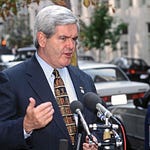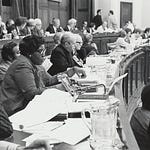
The government is taking your hard-earned money. Politicians create inflation through big spending, destroying individual initiative and endangering your children’s future. Joe Biden is hiring 87,000 Internal Revenue Service agents to kick down your door and steal your hard-earned money!
You’re familiar with these ideas, but they first took the national stage in Arizona Senator Barry Goldwater’s 1964 presidential campaign.
Funny how Goldwater keeps showing up in this podcast. If you are a dedicated listener, you know he lost that presidential race—badly. But you also know that the Goldwater campaign brought the far right into the Republican party as a force to be reckoned with, and 60 years later, they are running the show. Goldwater also invented an interesting political paradox that Republicans have been refining ever since. It goes like this: “You can’t trust Washington, you can’t trust politicians, but you can trust me.”,
One of Goldwater’s most prominent and dedicated backers, actor Ronald Reagan, felt the political winds changing in 1964. With no political resumé but plenty of experience in movies, television, and giving speeches on behalf of General Electric, Reagan made anti-government politics the keystone of his successful campaign for governor of California in 1966 and became President of the United States in 1980.
As President, Reagan promised to eliminate waste, bureaucracy, red tape, and incompetence—but these were red herrings and covered for other conservative goals: dismantling the welfare state, cutting taxes for corporations and the wealthy, and eliminating regulations that protected the public but cost business money.
The government wasn’t smaller when Reagan left office in January 1989—it was bigger--and, according to the libertarian Cato Institute, the federal deficit ballooned from 79 billion to 1.1 trillion. Moreover, despite all the talk about small government, Republican Presidents have historically driven deficit spending and increased the size of government. For example, starting in 2008, Barack Obama added 2 million jobs but cut them in his second term; Donald Trump re-added those 2 million jobs in only four years.
In the 21st century, as the GOP has left libertarian economic principles by the wayside, they have increasingly adopted strident libertarian rhetoric urging right-wing partisans to distrust any government initiative. Whether it is shrinking the welfare rolls, cutting taxes, or eliminating regulations, the message is: Government can’t be trusted.
The anti-government sentiment that Barry Goldwater mobilized and Ronald Reagan rode to the White House on has become a nightmare of conspiracy theories and fantastical accusations about a “Deep State” plot to destroy democracy.
To understand more about the history of anti-government thinking, I picked up Amy Fried and Douglas Harris’s book, At War with Government: How Conservatives Weaponized Distrust from Goldwater to Trump (Columbia University Press, 2021.) Amy is the John M. Nickerson Professor of Political Science at the University of Maine and works on public opinion; Doug is a professor of political science at Loyola University Maryland and a scholar of Congress and political media.
You can download this podcast here or subscribe for free on Apple iTunes, Spotify, Google Podcasts, or Soundcloud. And if you liked this episode, please join us!
Program notes:
In the opener, I feature clips from a 1964 Barry Goldwater campaign commercial, Ronald Reagan, Congressman Jim Jordan, and Donald Trump.
The accusation that the Biden administration is hiring an army of IRS agents to audit ordinary Americans has been debunked here.
You can read the Cato Institute’s examination of Ronald Reagan’s “Big Government” legacy.
Amy mentions Speaker of the House Newt Gingrich as a pivot point for government distrust in the 1990s. In addition, listeners may want to check out Julian Zelizer’s Burning Down the House: Newt Gingrich, the Fall of a Speaker, and the Rise of the New Republican Party (Penguin Press, 2020).
Listeners know that Claire is obsessed with Phyllis Schlafly, and she brings her up yet again in this episode: you can read A Choice Not an Echo (Regnery Press, 2014. Originally 1964).
Amy mentions William Kristol’s belief that the GOP Congress should firmly reject any policy initiative from the Clinton administration. This view became popularized on the right by right-wing broadcaster Rush Limbaugh. You can read more about Limbaugh’s efforts to drive the Republican party to the right in Zev Chafets, Rush Limbaugh: An Army of One (Sentinal, 2010).
Doug mentions the agricultural bailout during the Trump administration: you can read more about that here.
Claire mentions the controversial CNN Trump Town Hall on May 10, 2023.
Claire and Amy discuss the importance of the ERA in mobilizing the distrust of government on the right: you can read about this in Donald G. Matthews and Jane Sherron De Hart, Sex, Gender, and the Politics of ERA: A State and the Nation (Oxford University Press, 1990.)
Political scientist Stuart Shapiro has written about Donald Trump’s plan to erode or eliminate the civil service here.
Doug mentions Republican political consultant Frank Luntz. You can learn more about Luntz’s strategic thinking in Candidates, Consultants, and Campaigns: The Style and Substance of American Electioneering (Blackwell, 1988)













Share this post